9+ SAMPLE Community Agreement
-
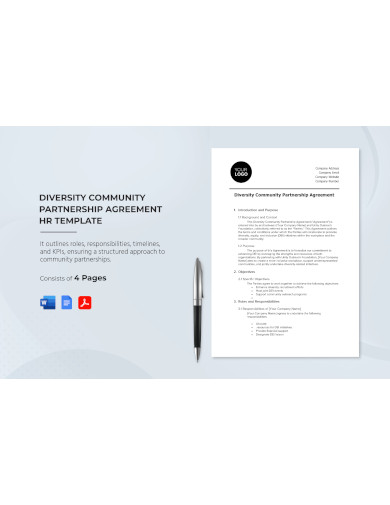
Diversity Community Partnership Agreement HR Template
download now -
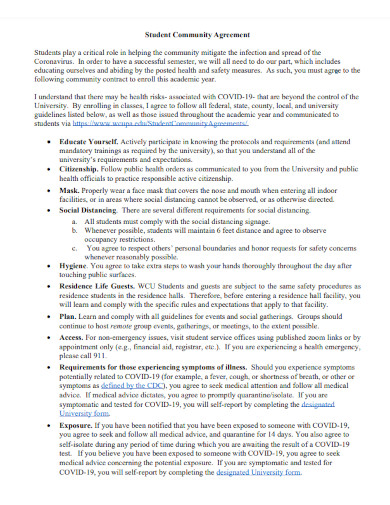
Student Community Agreements
download now -
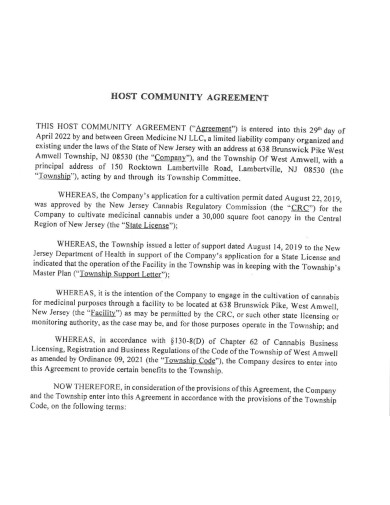
Host Community Agreement
download now -
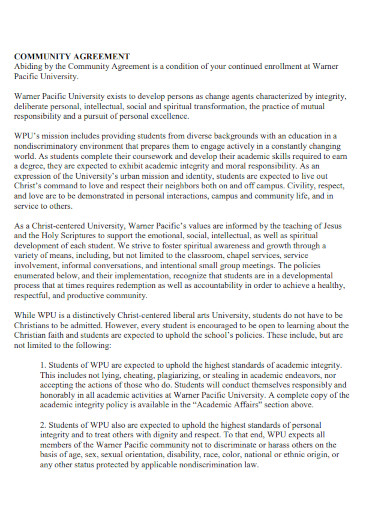
Sample Community Agreement template
download now -
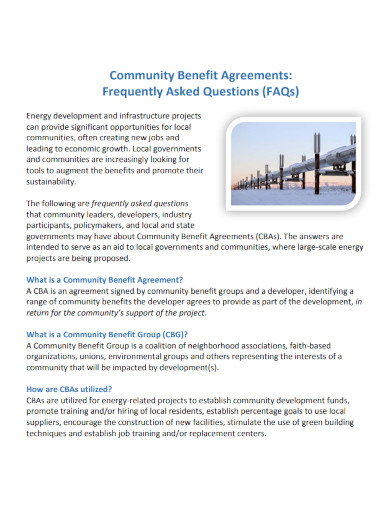
Community Benefit Agreements
download now -
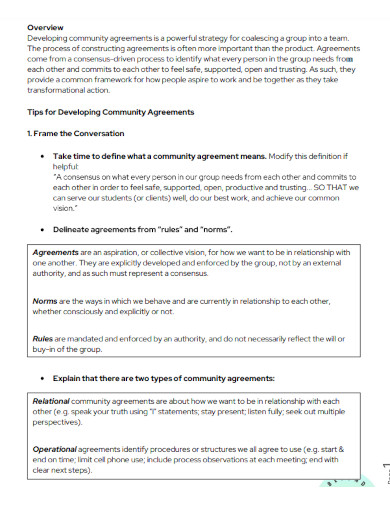
Creating Community Agreements
download now -
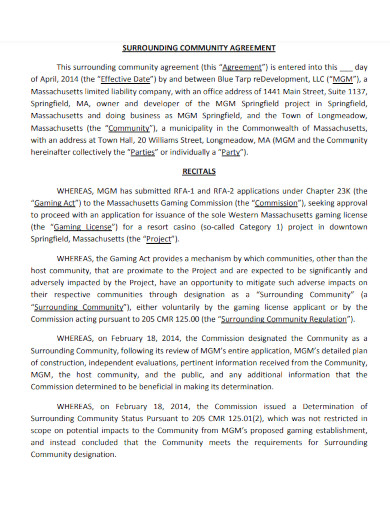
Surrounding Community Agreement
download now -
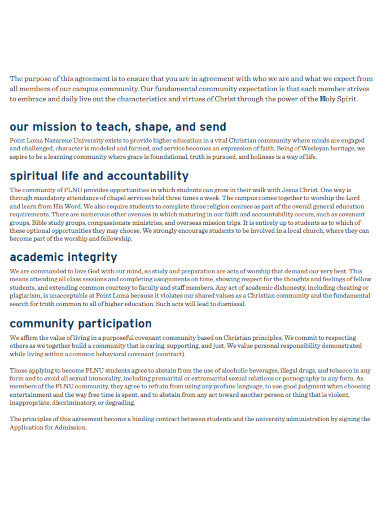
Community Living Agreement
download now -
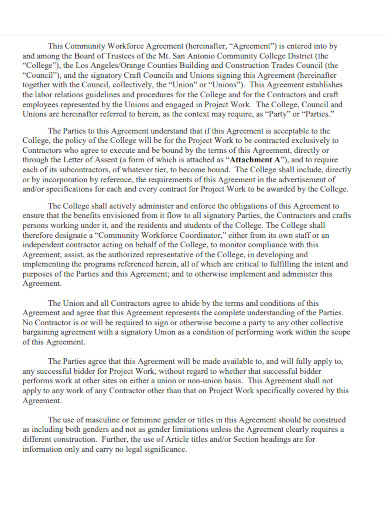
Community Workforce Agreement
download now -
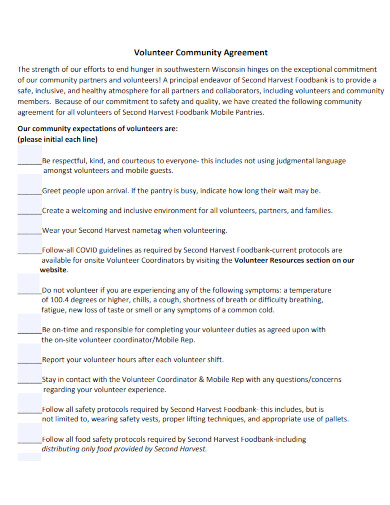
Volunteer Community Agreement
download now
FREE Community Agreement s to Download
9+ SAMPLE Community Agreement
What is Community Agreement?
What are Community Agreements Examples?
Why is a Community Agreement Necessary?
How Does the Community Agreement Benefit Members?
How do You Draft a Community Agreement?
What is the Purpose of a Community Benefits Agreement?
How Can I Contribute to the Community According to the Agreement?
Can the Community Agreement Be Updated?
What Topics Does the Community Agreement Cover?
What is Community Agreement?
Introduction
Welcome to our vibrant community! At the heart of our digital space lies our Community Agreement, a sample document designed to cultivate a sense of unity, understanding, and respect among all members. This agreement serves as a guide for interactions, ensuring a positive and inclusive environment for everyone involved.
You May Also See SAMPLE Participation Agreement
Section 1: Purpose
Our community thrives on diversity and shared values. This section outlines the purpose of our agreement – to create a space where individuals can connect, collaborate, and contribute positively to the collective experience.
Section 2: Core Values
Explore the fundamental principles that define our community. From respect and empathy to open communication, these core values set the tone for meaningful interactions and relationships.
Section 3: Code of Conduct
Dive into the specifics of how we expect our members to engage with one another. Our code of conduct encourages constructive dialogue, discourages harassment, and promotes an atmosphere of mutual respect.
Section 4: Guidelines for Contribution
Discover how you can actively contribute to the community. Whether you’re sharing ideas, providing feedback, or participating in discussions, these guidelines ensure a collaborative and enriching experience for all.
Section 5: Conflict Resolution
No community is without its challenges. Learn about our approach to conflict resolution, emphasizing communication and understanding to address issues and maintain a harmonious environment.
You May Also See SAMPLE Membership Agreement
What are Community Agreements Examples?
1. Facebook Community Standards:
Facebook’s community standards outline guidelines regarding safety, authenticity, and respect. They cover issues like hate speech, violence, and nudity to ensure a positive user experience.
2. Reddit Content Policy:
Reddit’s content policy defines what is and isn’t allowed on the platform. It addresses areas such as harassment, spam, and illegal content to maintain a diverse and respectful community.
3. Twitter Rules:
Twitter’s rules focus on safety and privacy. They cover topics like abusive behavior, fake accounts, and graphic content, aiming to create a secure environment for agreement users.
4. YouTube Community Guidelines:
YouTube’s community guidelines set expectations for content creators. They include policies on hate speech, harassment, and copyrighted material to foster a supportive and creative community.
5. Online Forum Community Agreement:
A general online forum might have guidelines regarding respectful communication, avoiding spam, and staying on-topic. These agreements encourage positive discussions and discourage disruptive behavior.
6. Educational Community Agreement:
In an educational community, agreements may include guidelines for respectful discourse, academic integrity, and collaboration to ensure a conducive learning environment.
7. Gaming Community Code of Conduct:
Gaming communities often have codes of conduct addressing in-game behavior, communication, and fair play to enhance the gaming experience for all participants.
8. Professional Networking Platform Guidelines:
Platforms like LinkedIn have guidelines on professional conduct, emphasizing professional communication, avoiding spam, and respecting others’ privacy and opinions.
You May Also See SAMPLE Volunteer Agreement Templates
Why is a Community Agreement Necessary?
A Community Agreement is necessary for several important reasons:
1. Establishing Expectations:
A Community Agreement helps set clear expectations for the behavior and interactions of community members. It outlines the standards that contribute to a positive and respectful environment.
2. Creating a Safe Space:
By defining acceptable behavior, a Community Agreement contributes to creating a safe and inclusive space for all members. It helps prevent harassment, bullying, or any form of behavior that could compromise the well-being of community members.
3. Fostering a Positive Culture:
The agreement serves as a foundation for fostering a positive and constructive culture within the community. It encourages members to engage in meaningful and respectful interactions, promoting a supportive atmosphere.
4. Protecting Against Misuse:
A Community Agreement acts as a deterrent against misuse of the community platform. It provides a basis for addressing violations and implementing consequences for members who do not adhere to the established guidelines.
5. Clarifying Rules and Policies:
It clarifies the rules and policies governing the community, reducing ambiguity and misunderstandings. This clarity is essential for members to navigate the community space with confidence.
6. Encouraging Accountability:
The agreement encourages accountability among community members. It helps individuals understand their responsibilities and the impact of their actions on the overall community dynamic.
7. Promoting Inclusivity:
In many cases, a Community Agreement includes guidelines for promoting inclusivity and diversity within the community. This ensures that all members feel welcome and valued.
8. Resolving Conflicts:
When conflicts arise, the Community Agreement provides a framework Agreement for resolution. It outlines processes for addressing disputes and maintaining a harmonious environment even in challenging situations.
9. Adapting to Community Growth:
As communities evolve and grow, a Community Agreement can be updated to reflect the changing needs and dynamics of the group. This adaptability helps ensure that the guidelines remain relevant and effective over time.
10. Building Trust:
Having a transparent Community Agreement builds trust among community members.
How Does the Community Agreement Benefit Members?
1. Clear Expectations:
Members gain a clear understanding of the community’s expectations and standards of behavior. This clarity helps create a harmonious and respectful environment.
2. Safe and Inclusive Space:
The agreement contributes to creating a safe and inclusive space by defining acceptable behavior. Members feel more secure knowing that the community is committed to preventing harassment, bullying, or any form of inappropriate conduct.
3. Positive Interaction Culture:
By providing guidelines for positive interactions, the agreement fosters a culture of respect and constructive engagement. This encourages members to contribute meaningfully to discussions and activities.
4. Protection Against Misuse:
Members are protected from potential misuse of the community platform. The agreement establishes rules and consequences for violations, discouraging behavior that could harm the community’s well-being.
5. Reduced Ambiguity:
The agreement minimizes ambiguity by clearly outlining rules and policies. Members can navigate the community with confidence, knowing what is expected of them and what behaviors are considered acceptable.
6. Increased Accountability:
Members become more accountable for their actions within the community. The agreement helps individuals understand their responsibilities and encourages them to contribute positively to the community.
7. Promotion of Inclusivity:
Many Community Agreements include guidelines that promote inclusivity and diversity. This ensures that all members, regardless of background or identity, feel welcome and valued.
8. Conflict Resolution Framework:
In the event of conflicts, the agreement provides a structured framework for resolution. This ensures that disputes can be addressed fairly and efficiently, maintaining a positive atmosphere.
9. Adaptability to Growth:
As the community evolves, the agreement can be adapted to accommodate changes and new dynamics. This adaptability ensures that the guidelines remain relevant and effective as the community grows.
10. Trust Building:
A transparent and well-communicated Community Agreement builds trust among members. It demonstrates the community’s commitment to creating a positive and trustworthy environment for everyone.
11. Sense of Belonging:
Knowing the rules and expectations fosters a sense of belonging. Members feel more connected to the community when they understand and actively contribute to the shared values outlined in the agreement.
You May Alse See SAMPLE Usage Agreement
How do You Draft a Community Agreement?
Drafting a community agreement involves careful consideration of the community’s values, goals, and the expected
behaviors of its members. Here’s a step-by-step guide to help you draft a comprehensive community agreement:
1. Define the Purpose and Scope:
Clearly articulate the purpose of the community agreement.
Specify the scope of the work contract, outlining what it covers and any limitations.
2. Identify Core Values:
Determine the core values that the community upholds.
Define principles that reflect the desired culture and atmosphere.
3. Outline Code of Conduct:
Establish a clear code of conduct that members must adhere to.
Include guidelines on respectful communication, avoiding harassment, and promoting positive interactions.
4. Guidelines for Contribution:
Define how members can actively contribute to the community.
Specify rules for sharing content, providing feedback, and participating in discussions.
5. Address Conflict Resolution:
Develop a structured approach for resolving conflicts within the community.
Outline steps for reporting issues and the procedures for addressing disputes.
6. Content Guidelines:
Establish rules regarding the type of content that is acceptable
Address issues such as plagiarism, inappropriate material, or
any content that goes against the community’s values.
7. Inclusivity and Diversity:
Include guidelines to ensure inclusivity and diversity.
Promote an environment where members from various backgrounds feel welcome and valued.
8. Consequences for Violations:
Clearly state the consequences for violating the community agreement.
Specify whether violations will result in warnings, temporary suspension, or permanent removal from the community.
9. Communication Protocols:
Define how official communications within the community will be conducted.
Clarify the roles of moderators and administrators in managing communication.
10. Privacy and Security:
Address privacy concerns and establish guidelines for protecting members’ personal information.
Implement measures to ensure the security of the community platform.
11. Regular Review and Updates:
Schedule regular reviews of the community agreement to ensure its relevance.
Allow for updates based on the evolving needs and dynamics of the community.
12. Seek Input from Members:
Encourage community members to provide input during the drafting process.
Consider feedback to ensure the agreement is reflective of the community’s collective values.
13. Make it Accessible:
Ensure that the community agreement is easily accessible to all members.
Consider creating a dedicated section on the community platform or website.
14. Communicate Changes:
Clearly communicate any changes or updates to the community agreement.
Give members sufficient notice and provide explanations for modifications.
15. Legal Considerations:
Depending on the nature of the community, consider seeking legal advice to ensure the agreement aligns with relevant laws
and regulations.
What is the Purpose of a Community Benefits Agreement?
A Community Benefits Agreement (CBA) is a legally binding contract between a community and a developer or corporation involved in a project, typically a large-scale development or construction project. The primary purpose of a Community Benefits Agreement is to ensure that the community receives tangible benefits and improvements as a result of the project. Here are some key purposes:
1. Community Empowerment:
CBAs are designed to empower communities by giving them a voice in the decision-making process related to development projects. This helps ensure that community members have a say in how the project will impact their neighborhood.
2. Addressing Community Concerns:
CBAs provide a mechanism for addressing specific concerns and issues raised by the community regarding the proposed project. This could include considerations such as affordable housing, job opportunities, environmental protections, or improved public infrastructure.
3. Ensuring Fair and Equitable Development:
CBAs aim to promote fair and equitable development. They seek to prevent negative impacts on vulnerable populations and ensure that the benefits of the project are distributed equitably among community members.
4. Promoting Social and Economic Justice:
CBAs often include provisions that promote social and economic justice. This may involve commitments to affordable housing, local hiring initiatives, job training programs, and other measures to enhance the well-being of community residents.
5. Environmental Stewardship:
Some CBAs include environmental provisions to address concerns related to the impact of the project on the local environment. This could involve commitments to sustainable practices, green spaces, or other environmentally friendly initiatives.
6. Community Investment:
CBAs commonly stipulate financial or in-kind contributions from the developer to fund community projects, amenities, or services Agreement. This investment is intended to offset any negative consequences of the development.
7. Mitigating Gentrification:
In areas where development may contribute to gentrification, CBAs may include measures to mitigate displacement of existing residents. This could involve affordable housing requirements, rent control, or other anti-displacement measures.
8. Long-Term Collaboration:
CBAs establish a framework for ongoing collaboration between the developer and the community. This collaboration can extend beyond the construction phase to address ongoing concerns and ensure that the community continues to benefit from the project.
9. Legal Enforcement:
One of the critical aspects of CBAs is their legally binding nature. Once negotiated and agreed upon, the terms of the agreement are enforceable by law, providing a level of assurance to the community that the promised benefits will be delivered.
How Can I Contribute to the Community According to the Agreement?
Contributing to the community in accordance with the Community Agreement involves active participation and adherence to the outlined guidelines. Here are some general ways you can contribute:
1. Respectful Communication:
Engage in respectful and constructive communication with fellow community members.
Avoid offensive language, personal attacks, or any form of harassment.
2. Positive Interaction:
Contribute to a positive and inclusive community atmosphere.
Encourage and support other members in their endeavors.
3. Adherence to Guidelines:
Follow the guidelines outlined in the Community Agreement, Familiarize yourself with the rules related to content creation, discussions, and any other specified community activities.
4. Active Participation:
Actively participate in community discussions, activities, and initiatives, Share your knowledge, experiences, and insights to enrich the community.
5. Contribution to Content:
If applicable, contribute valuable and relevant content to the community, Ensure that your contributions align with the content guidelines provided in the agreement.
6. Responsible Sharing:
Share information responsibly and fact-check when sharing news or data, Avoid spreading misinformation or engaging in harmful behavior.
7. Conflict Resolution:
Participate in conflict resolution processes outlined in the agreement, Report issues responsibly and work towards amicable resolutions.
8. Feedback and Suggestions:
Provide constructive feedback to community moderators or administrators, Share suggestions that could enhance the community experience.
9. Promotion of Inclusivity:
Promote inclusivity within the community, Be respectful of diverse perspectives and contribute to a welcoming environment.
10. Responsible Content Creation:
If content creation is part of the community activities, create content that adheres to the guidelines and adds value to the community, Respect copyright and intellectual property rights.
11. Support for Community Initiatives:
Support community initiatives, projects, or events, Contribute time, skills, or resources to community-driven endeavors.
12. Educate Yourself:
Stay informed about updates to the Community Agreement, Educate yourself on community guidelines and any changes that may occur.
13. Promotion of Positivity:
Contribute to a positive online environment by avoiding negativity and fostering a sense of community spirit.
Celebrate the achievements and contributions of fellow members.
Can the Community Agreement Be Updated?
Yes, the Community Agreement can be updated to reflect the evolving needs and dynamics of the community. Members are usually notified of any changes, and they are expected to review and adhere to the updated guidelines.
You May Also See SAMPLE Sharing Agreements
What Topics Does the Community Agreement Cover?
The Community Agreement typically covers a range of topics, including but not limited to respectful communication, content guidelines, conflict resolution, and any specific rules relevant to the community’s purpose.
In conclusion, embracing a Community Agreement is key to fostering a positive online environment. By adhering to guidelines, engaging respectfully, and contributing meaningfully, community members create a thriving space. This guide provides essential tips on crafting effective agreements, ensuring inclusivity, and promoting collaborative interactions. As we collectively commit to these principles, we cultivate a digital community that reflects shared values and encourages the best in each member.
